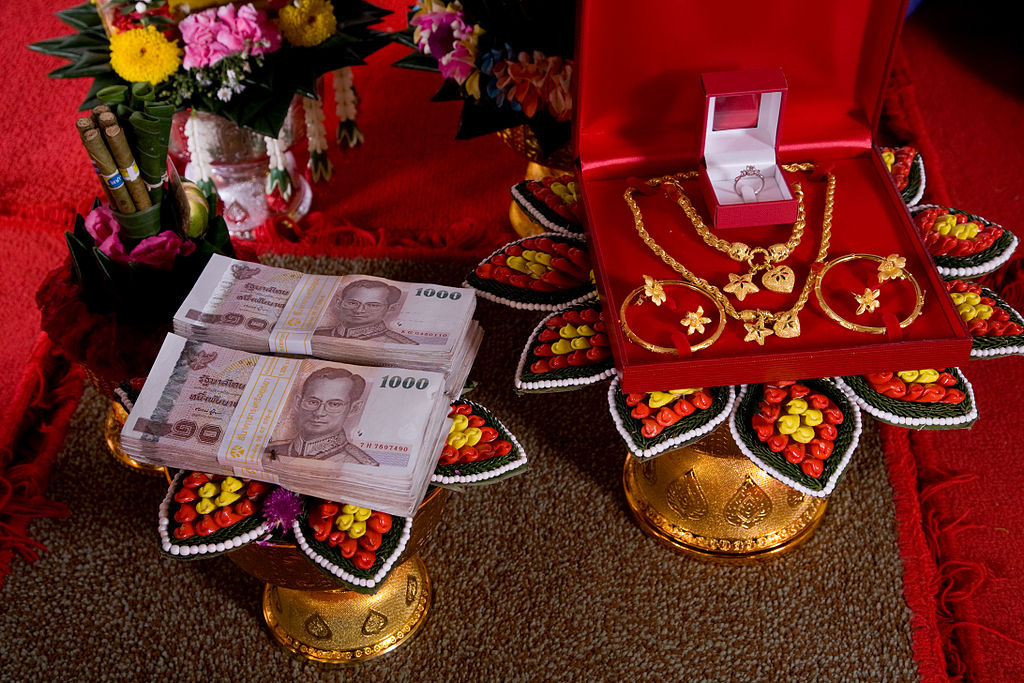Cover Photo: This photograph shows the traditional, formal presentation of the bride price (also known as “sin sot” or “dowry”) at an engagement ceremony in Thailand.
Thomas & Joanna Ainscough. Tainscough at English Wikipedia [CC BY-SA 3.0].
Volume 1, Number 4 | Op-Ed
Marriage generally happens around the world, but the culture of marriage is different across countries. For some countries, marriage is about two persons’ decision to start their family together. However, there are many countries especially in the Eastern world where marriage is not the two persons’ decision like the Western world. As there is “dowry”, “Sin-sod-thong-mun/sin-sod” or monetary assets involve with the marriage, both a bride and groom’s family have to talk together and be a key position in this marriage. Even though many people say the dowry system is not necessary for marriage, I think there should be a dowry system due to several reasons.
First, it is the financial assets that can guarantee the quality of life of the bride (daughter) and the kids. As there is a chance of divorce and harassment between the spouses, parents of the brides may ask for a certain amount of the assets to make sure that their daughter has a certain standard of living in the marriage life or after divorce. According to Boonprakarn and Laeheem (2014), most of the domestic violence between the spouses are physical, psychological and sexual assaults on women which are done by exhibiting male’s power of the husband to force the woman to do something that he wants her to do (or not to do) without considering her personal rights. Therefore, there are many women willing to divorce or the rate of divorce increase up to 39% in 2016 (Bangkok Post, 2017). Since most of the kids live with their mother after the divorce, a lot of money is required to grow the children effectively. Costs of education fees, health care services or housing are relatively high nowadays, so the bride should take a certain amount of money or sin-sod to make sure that she and her child lives after divorces are good enough. Moreover, sin-sod shows the capability of the groom to take care of his wife. There are many women who leave a job and become housewives after marriage to take care of her children, so the higher amount of sin-sod means the more capable of the husband to take care of his wife and his children.
Second, the dowry system creates new business opportunities. Since Thai people concern on the social reputation, it is better to have a fabulous and glamorous wedding ceremony. Therefore, the new wedding business generated. For example, “Dowry Business” which the new couple can lend money, cars or gold to present in the wedding day and show to the wedding attendants is popular in recent years. The business is getting attention to young people. As the average income of Thai people is not high, lending those assets and paying at the package prices (1 million baht + 1 E-class Mercedes Benz is 50,000 baht) are a good strategy for them.
Moreover, there are many private banks in Thailand that provide wedding loans for the couples. According to Pongsiri (2014), more than a half of the new wedding couple spend beyond the budget limit because there are many costs related to wedding ceremonies such as food and beverage, venue, pre-wedding photo and wedding dress etc. Therefore, wedding loans are popular among the new couple because they can show their wealth and stability through the luxury ceremonies and the venue of the wedding parties. As social connection and reputation are one of the most concerned of Thai people, there are a lot of people willing to borrow from the bank to keep their pride. Hence, this is an opportunity for development in the banking sectors by extending their services range.
In conclusion, the dowry system generates benefits to Thai people in these several aspects in both a guarantee of high quality of life of the brides and the children and create the new business opportunities, I think this system is still necessary and prevalent in Thai society.
References:
- Bangkok Post. (2017, December 12). Thai divorce rate up to 39%. Retrieved from https://www.bangkokpost.com/news/general/1376855/thai-divorce-rate-up-to-39-
- Boonprakarn, K. and Laeheem, K. (2014). Domestic Violence Behaviors between Spouses in Thailand. Canadian Center of Science and Education. 10(16), 152-159. Retrieved from http://citeseerx.ist.psu.edu/viewdoc/download?doi=10.1.1.681.5904&rep=rep1&type=pdf
- Jitchinakul, K. (2010). Wedding Ceremony: Changes on the Business Way. Thailand Journal of Documentary Studies. 7(1), 4-5. Retrieved from http://eprints.utcc.ac.th/258/2/258abstract.pdf
- Pongsiri, K. (2014). Wedding in Thailand: Traditional and Business. International Journal of Social, Behavioral, Educational, Economic, Business and Industrial Engineering. 8(9), 2937-2941. Retrieved from https://pdfs.semanticscholar.org/19fb/1b59727daba7237cfe1c2b1f48c8431bae9f.pdf












































Dear Nattanicha,
in your article you raised a very interesting and important topic.
I have heard about the dowry system in India and other countries, but I didn’t expect that it still exists in Thailand. This is because I saw Thailand as quite progressive when it comes to gender roles, with many women holding cabinet positions or working in high professions such as scientists, doctors or engineers. The dowry system is very traditional though.
While it is obvious that the culture of marriages certainly differs across cultures and keeping those traditions does not necessarily have to be a bad thing, I highly disagree that dowry systems are necessary and beneficial. In my opinion, they should even be abolished completely.
First of all and most importantly, dowry systems directly or indirectly oppress women. In Thailand the groom has to pay a price for the bride and this comes equal to “buying” the bride. This way, women are treated as property, as goods that can be exchanged. Moreover, the value of the woman is assessed according to her social status, level of education, occupation, family background and virginity. Thus, a woman who went to university and is still a virgin at the time of the marriage is much more “worth” than one who didn’t have the chance to get high education because she comes from a poor family with a low social status and eventually even lost her viriginity because she got sexually abused. Is that a fair assessment? I don’t think so.
Second, dowry systems are a barrier to gender equality and this argument can work for both men and women. Men are also kind of discriminated when they eventually can not afford paying the price for the bride and are held back from marrying their dream wife. Clearly, they could borrow a loan from one of the private banks as you mentioned. But honestly, does there really have to be an additional financial barrier to marriage?
Women, on the other hand, are automatically seen as financially uncapable to take care of themselves and their children, because they are probably expected to “just” being a housewive after marriage. Well, welcome to the 21st century where the role of women is changing and many women also want to work and earn money while they are still taking care of their children.
Of course, women face many difficulties financing everything on their own after getting divorced and this is not only the case in Thailand. But I don’t think that a dowry system is needed to solve this problem, which leads me to my third argument. Instead of getting paid a bride price, women should receive more support in general to be able to work and take care of their children at the same time, even without husband. The state should increase child care allowances, which actually just happened here in early 2019 (Bangkok Post, Child care allowance jumps 50%, published on 10/01/2019). Moreover, spousal support and alimony payments should be mandatory and paid at a flat-rate by men after divorce, if women continue to take care of their children on their own.
Another point I wanted to add is that the dowry system here an also create incentives for women to marry just for the money and to work hard to gain high education and social status just to receive a high bride price. Well, what I was thinking with respect to the existing prostitution and sex industry in Thailand, do women sell themselves and their bodies not enough already?
Finally, this is my view of dowry systems and why I think that they are neither necessary nor beneficial and should therefore not be continued in any part of the world. But clearly, my cultural background differs from yours, hence my understanding of this topic might be very different from yours. This is why I am very curious about what you have to say to my comment.